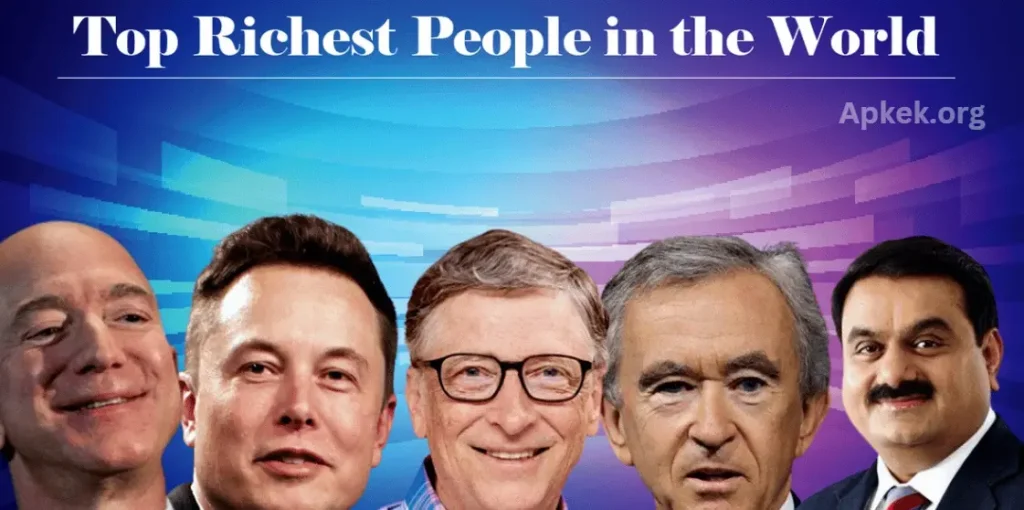Some individuals swim in vast pools of wealth—no surprise they’re known as billionaires. Collectively, their net worth reaches an astounding $12.8 trillion, representing just 2,640 people within this elite group. This figure could have been even higher had they chosen to leverage the Pawns.app, a tool that may very well be in use by some of them.
However, the story doesn’t end there. Within this select circle, a smaller and even more exclusive group stands out. These are the top 10 wealthiest individuals, with a combined net worth of $1.44 trillion. Let’s take a closer look at who these financial titans are and explore the strategies behind their success.
1. Elon Musk
Net Worth: $300 Billion
Elon Musk, the CEO of Tesla, SpaceX, and a variety of other ventures remains the wealthiest person in the world in 2025. His wealth stems primarily from his significant stakes in Tesla, the electric vehicle company he transformed into a global leader, and SpaceX, which is reshaping space exploration. Musk’s forward-thinking investments in artificial intelligence, neural technology, and energy have also played a crucial role in his continued dominance atop the global wealth rankings. His ability to push boundaries in multiple industries keeps him at the top.
2. Bernard Arnault & Family
Net Worth: $235 Billion
As the head of LVMH (Moët Hennessy Louis Vuitton), Bernard Arnault controls the world’s largest luxury goods conglomerate. His wealth comes from the empire he’s built, which includes iconic brands such as Louis Vuitton, Christian Dior, and Fendi. In 2025, Arnault continues to capitalize on the growing demand for luxury goods across emerging markets, solidifying his position as one of the world’s wealthiest individuals. His business acumen in the luxury sector has kept him at the top, even amid economic challenges.
3. Jeff Bezos
Net Worth: $195 Billion
Amazon’s founder, Jeff Bezos, has seen his fortune continue to grow in 2025. Though he stepped down as CEO of Amazon in 2021, Bezos remains deeply involved with the company, which continues to dominate global e-commerce, cloud computing, and digital services. His other ventures, including his space exploration company, Blue Origin, and his investment firm, Bezos Expeditions, have further bolstered his wealth. Bezos’s foresight in diversifying his investments has ensured his continued place among the world’s wealthiest.
4. Bill Gates
Net Worth: $160 Billion
Co-founder of Microsoft, Bill Gates has been a fixture in the list of the world’s wealthiest for decades. His fortune in 2025 is largely the result of his early and wise investments in technology, notably Microsoft. Gates has also significantly expanded his wealth through investments in sectors like clean energy, healthcare, and agriculture via his firm, Cascade Investment. Moreover, his philanthropic efforts through the Bill & Melinda Gates Foundation have not only shaped global health but have solidified his legacy as a prominent figure in both business and charity.
5. Warren Buffett
Net Worth: $150 Billion
Known as the “Oracle of Omaha,” Buffett built his wealth through his company, Berkshire Hathaway. Buffett’s investment strategy of buying undervalued companies and holding them for the long term has made him one of the most successful investors in history. In 2025, Buffett remains an influential figure in global finance. His portfolio is diverse, ranging from insurance and energy to consumer goods and technology, continuing to grow even as he approaches retirement age.
6. Larry Ellison
Net Worth: $140 Billion
The co-founder and executive chairman of Oracle, Larry Ellison’s wealth has seen significant growth in 2025. Oracle remains one of the largest software and cloud computing companies in the world, and Ellison has expanded his wealth by investing in various sectors, including real estate and biotechnology. Ellison’s role as a major shareholder in Tesla has also contributed to his increased fortune, making him one of the wealthiest individuals on the planet.
7. Mark Zuckerberg
Net Worth: $130 Billion
Mark Zuckerberg’s rise from Harvard student to tech titan has been nothing short of extraordinary. As the co-founder and CEO of Meta (formerly Facebook), Zuckerberg has built an empire in social media, virtual reality, and digital advertising. In 2025, Meta’s growing ventures into the metaverse and AI-driven technologies have further fueled Zuckerberg’s wealth. His diversified investments in areas like digital currency and global connectivity continue to shape his financial future.
8. Larry Page
Net Worth: $125 Billion
As one of the co-founders of Google, Larry Page remains one of the wealthiest individuals in the world in 2025. Page’s wealth has been fueled by his pioneering work in search engines, digital advertising, and AI. Despite stepping down from his role at Alphabet, Google’s parent company, he has continued to lead a number of innovative projects, such as autonomous driving company Waymo, and investments in cutting-edge technologies like quantum computing. These ventures ensure that his wealth continues to grow in the rapidly evolving tech world.
9. Sergey Brin
Net Worth: $120 Billion
Alongside Larry Page, Sergey Brin helped create Google, which would later become one of the most influential companies in the world. Brin’s wealth in 2025 is similarly tied to his role in Alphabet’s continued success. He also remains a key player in Alphabet’s experimental ventures, such as self-driving cars and advanced AI projects. With his deep involvement in groundbreaking technologies, Brin’s wealth is expected to continue expanding in the years to come.
10. Mukesh Ambani
Net Worth: $115 Billion
Mukesh Ambani, the chairman and largest shareholder of Reliance Industries, is the richest person in India and one of the wealthiest globally in 2025. Reliance has major interests in petrochemicals, refining, oil, telecommunications, and retail. In recent years, Ambani has significantly diversified his business holdings, investing heavily in tech ventures, retail, and green energy. His leadership has helped Reliance grow into a global powerhouse, solidifying his position as one of the world’s top 10 wealthiest people.
Frequently Asked Questions
How do people become the wealthiest in the world?
The wealthiest individuals typically achieve their financial success through innovation, entrepreneurship, and strategic investments. Many of them are founders or major stakeholders in tech companies, luxury goods empires, and global retail chains. Their ability to disrupt industries and invest wisely in emerging markets and technologies plays a key role in their financial rise.
What industries do the wealthiest people in the world dominate?
The wealthiest individuals primarily dominate industries like technology (software, social media, and e-commerce), luxury goods, energy, telecommunications, finance, and manufacturing. These sectors continue to experience growth, particularly with the rise of AI, cloud computing, renewable energy, and global connectivity.
What’s the role of innovation in creating wealth?
Innovation plays a crucial role in creating wealth, especially in technology-driven sectors. The most successful individuals often develop groundbreaking products or services that transform industries. For example, Elon Musk revolutionized electric vehicles with Tesla and space exploration with SpaceX, while Jeff Bezos created the e-commerce giant Amazon. This ability to innovate and stay ahead of market trends is a significant factor in accumulating vast wealth.
Are these billionaires involved in philanthropy?
Many of the world’s wealthiest individuals engage in philanthropy through charitable foundations and initiatives. Bill Gates, through the Bill & Melinda Gates Foundation, has committed to global health and poverty alleviation. Warren Buffett has pledged to give away the majority of his wealth, particularly through the Giving Pledge, which he co-founded. Others, like Elon Musk, have also made substantial contributions to causes like renewable energy and education.
How does the wealth of these individuals fluctuate?
The wealth of the wealthiest people can fluctuate significantly due to changes in the stock market, the performance of their companies, investments in emerging technologies, and global economic conditions. For example, Elon Musk’s wealth has seen significant changes due to fluctuations in Tesla’s stock price, while Amazon’s performance impacted Jeff Bezos’s wealth.
Why is the wealth gap increasing?
The wealth gap has widened in recent decades due to factors such as globalization, technological advancements, and financial markets becoming more complex. Many of the wealthiest individuals derive their fortunes from industries that have experienced exponential growth, such as tech, e-commerce, and luxury goods. These industries provide opportunities for outsized financial gains compared to traditional sectors, contributing to the growing disparity in wealth.
What role does technology play in the rise of these billionaires?
Technology has played a central role in the rise of many of the world’s wealthiest people. Individuals like Mark Zuckerberg (Meta), Larry Page and Sergey Brin (Google), and Elon Musk (Tesla, SpaceX) owe their fortunes to groundbreaking advances in digital technology, artificial intelligence, and space exploration. The technology sector continues to evolve rapidly, creating new opportunities for individuals to amass wealth.
Conclusion
The wealthiest people in the world exemplify the power of vision, innovation, and strategic decision-making. Their fortunes, built across industries such as technology, luxury goods, e-commerce, and energy, reflect the potential for massive financial success in today’s rapidly changing global economy. While their paths to wealth vary—some by founding transformative tech companies, others by leading long-standing global enterprises—the common thread is their ability to innovate, scale, and adapt to new opportunities.
As these billionaires continue to shape industries, their wealth also highlights broader trends, including the growing influence of technology and the increasing wealth gap. However, many of these individuals are also actively engaged in philanthropy, using their fortunes to address global challenges and improve lives.

